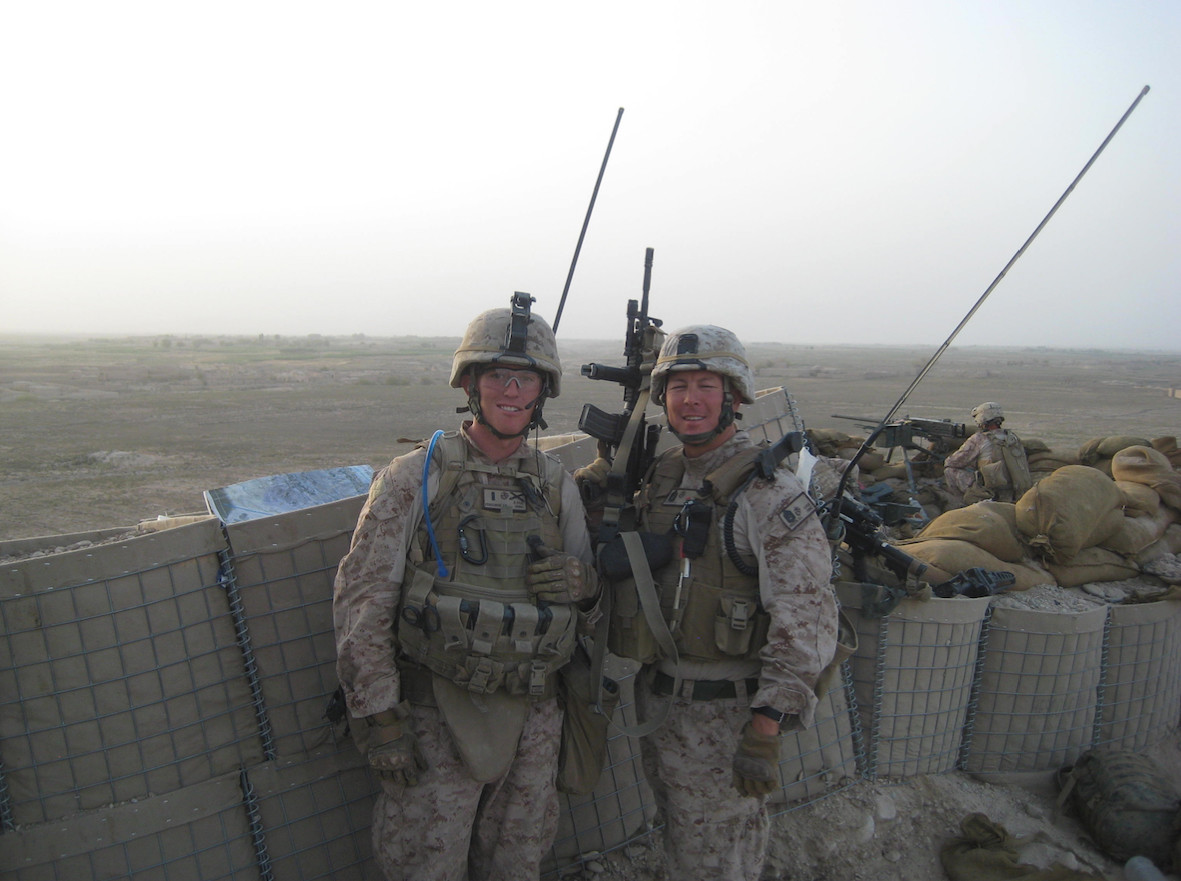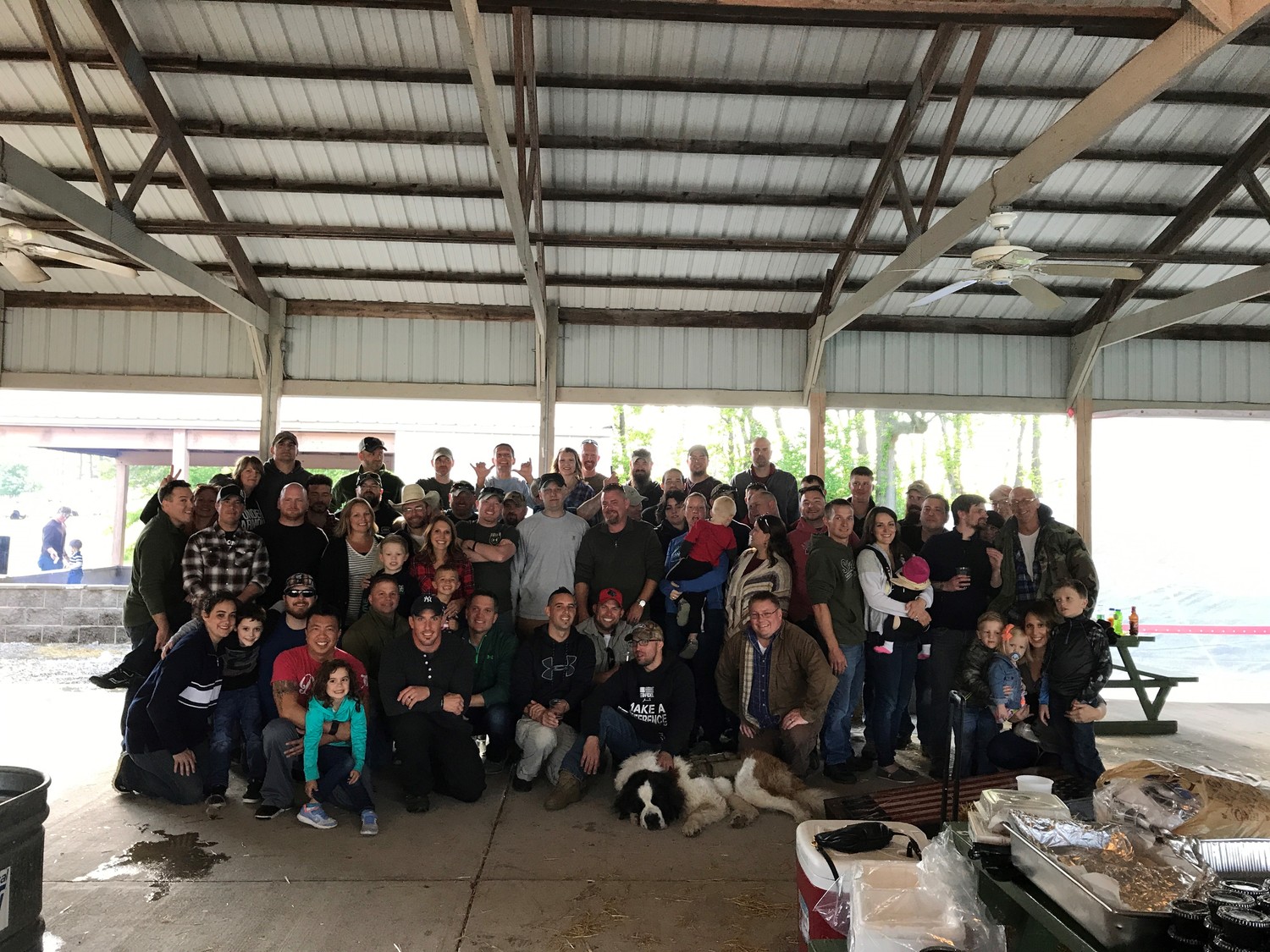Thursday, April 18, 2024
South Side High School alum brings together fellow veterans through Warrior Reunion Foundation
Former Marine reconvenes military units to heal after service
When James Ferguson came home in 2010 after serving for nearly eight months in Afghanistan as a platoon commander in the Marines, that chapter of his life remained painfully incomplete. Reuniting with his unit five years later, however, changed his life, and today Ferguson leads the Warrior Reunion Foundation, which has so far reconnected combat veterans at seven gatherings around the country.
Ferguson, 33, a former Rockville Centre resident who now lives in Maryland with his wife and 2-year-old daughter, graduated from South Side High School in 2003. Looking up to his father, Jim, and grandfather, Hugh, a World War II veteran and Silver Star recipient, he decided he wanted to follow in their footsteps after watching the terrorist attacks unfold on Sept. 11, 2001.
After four years at the University of Delaware, Ferguson was commissioned as a second lieutenant on active duty. He completed six months of training in Quantico, Va., and an additional five months at artillery school in Fort Sill, Okla., before being assigned to Camp Pendleton, Calif., as an artillery officer and platoon commander.
In 2010 he was deployed to Afghanistan, where he led one of two platoons, comprising a total of 120 Marines, that did daily foot patrols. “It’s basically walk toward the areas where you think the bad guys are until you get shot at, and then destroy them,” Ferguson said.
The unit had a 25 percent casualty rate, and five members were killed in action, including three from Ferguson’s platoon.
“We went through everything you join the Marine Corps to do: locate, close with and destroy the enemy,” Ferguson told the Herald. “We were doing it. We were absolutely the tip of the spear.” With that, he added, came the traumatic experience of watching people he loved being severely wounded or killed.
After the deployment ended, a majority of the unit’s members were either assigned elsewhere or left active duty. “We never had that chance to really heal together and process that experience,” Ferguson said, “because it takes time for those things to kind of manifest themselves.” He felt isolated, unable to explain to his loved ones what he had experienced. He also struggled with the guilt of not bringing home everyone in his platoon.
Rockville Centre resident Cliff Cornell, 49, who had met Ferguson at a Marine Corps Scholarship Foundation golf tournament about 10 years ago, recalled reconnecting with him several years later. “He said to me, ‘My dream is to get everybody back together,’” Cornell recalled.
Cornell offered Ferguson and his unit the use of his farm in Southold over the Memorial Day weekend in 2015. Mike Quilty, a longtime neighbor of Ferguson’s in Rockville Centre who was a naval submarine officer from 1988 to 1993, also got involved. “The best way to get support is to connect them back with the people they know and trust and served with,” Quilty, 52, said. “… To see what happened in that event, it was cathartic to everybody.”
Clean Vision Services, a Rockville Centre-based party rental company, donated large tents for the Marines to sleep in, Cornell said, and the Salvation Army donated cots, while other businesses and organizations donated beer, food and other services. More than 80 of the 120 members of the unit came to the reunion, and took part in a variety of outdoor activities and a memorial ceremony with Gold Star families for those killed in combat. Some of them told Ferguson that in a tent, on cots with the rest of the guys, they slept through the night for the first time in years. “It was at that moment where I was like, whoa, this is something powerful,” he said.
Cornell said that many of the veterans struggling with post-traumatic stress disorder, who may have been hesitant to agree to individual therapy, welcomed the healing that comes with being in a group. “That was the difference for everybody, I think,” he said. “Just being able to hold hands, hug, cry, be together and have some time to think about what had transpired.”
The impact that this kind of reunion could have on other veterans was clear to Ferguson. He officially launched the Warrior Reunion Foundation in 2017, and the eighth get-together is set to take place this weekend in northern Virginia.
The reuniting units do much of the planning on their own, and Quilty and Cornell noted the support of various community organizations that volunteer.
All of the gatherings, at no cost to the units, include some sort of service project “to reinvigorate … that sense of purpose that often is missing when you take off the uniform,” Ferguson said; a “wellness education” session, with information about organizations that help veterans; outdoor activities, like hiking, fishing and hatchet-throwing, to “re-awaken the warrior spirit”; and a memorial service. The Gold Star families benefit from the reunions, he added, because they hear stories from the veterans about their loved ones that they have never heard before.
The reunions focus on bringing out the positive attributes of combat veterans, who Ferguson said are often unfairly portrayed as broken men on medication that can’t take care of themselves. “We’ve been telling them they’re broken for so long that they’re starting to believe it,” he said, referring to various veterans groups that he believes have the wrong mission. “It was meaningful to have the importance of reunions as a mechanism for real healing recognized.”
The Warrior Reunion Foundation received the highest honor at the 19th annual Newman’s Own Awards ceremony at the Pentagon last month, a $50,000 award. “James was working really hard with his head down,” Quilty said, adding that as the foundation grows, the prize was “a welcome surprise just at the right time.”
Cornell said that another reunion is slated for his Southold farm on Memorial Day weekend in 2020. Each one gives Ferguson the opportunity to meet groups of heroes, like the members of his platoon. “Watching their faces light up when they see each other for the first time in years, and sitting around a campfire with them and listening to them share their stories, it’s almost like I get to be part of their unit’s story now,” Ferguson said. “… Being in their presence really restores your faith in what’s good about America at a pretty difficult time for our country.”
HELP SUPPORT LOCAL JOURNALISM
The worldwide pandemic has threatened many of the businesses you rely on every day, but don’t let it take away your source for local news. Now more than ever, we need your help to ensure nothing but the best in hyperlocal community journalism comes straight to you. Consider supporting the Herald with a small donation. It can be a one-time, or a monthly contribution, to help ensure we’re here through this crisis. To donate or for more information, click here.
Sponsored content
Other items that may interest you







